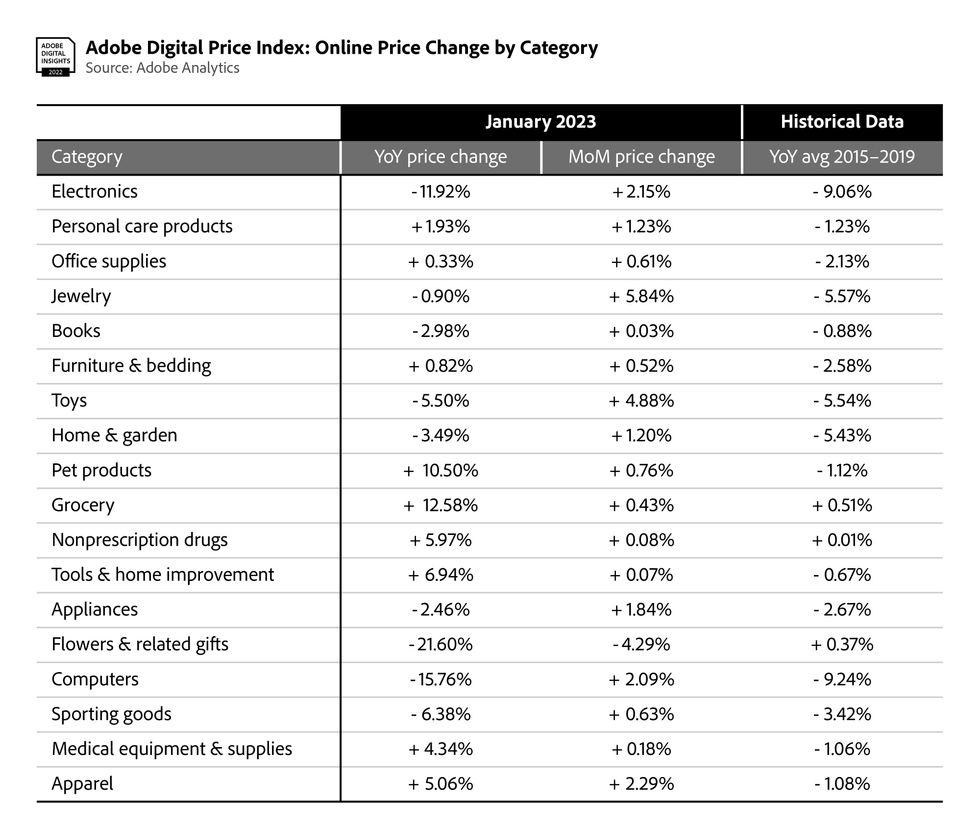Economy
09 February 2023
Online prices fell 1% in January, 5th straight month of deflation
The Adobe Digital Price Index showed price drops in electronics and home goods.

The Adobe Digital Price Index showed price drops in electronics and home goods.

For the fifth straight month, online prices continued to show signs of deflation to start 2023.
The Adobe Digital Price Index came in with the following readings for January 2023:
What’s driving the data? “Current demand levels are driving retailers to hold prices down and continue to clear out excess inventory,” said Patrick Brown, VP of growth marketing and insights at Adobe. “As shoppers become more selective in where they spend their money, ecommerce will be an important battleground this year as brands seek to retain customers and drive experience-led growth.”

Adobe Digital Price Index: 2015-2023. (Courtesy photo)
Overall, category-level data shows that inflation is reversing across ecommerce.
Half of the 18 categories tracked by Adobe showed falling prices on an annual basis. This included:
There was also cooling inflation in categories that have seen persistent price increases:
Still, the shift away from the holiday season – and its massive discounting to drive spending among cautious consumers amid inflation – meant prices ticked up on a short-term basis. Of the 18 categories tracked, only flowers and gifts (-4.29%) saw prices decrease on a monthly basis.
The takeaway: Despite the seasonal shift with the holidays, online prices are continuing to fall over the long haul. This is happening at the same time as inflation is cooling in the overall economy. After months of price increases and continued pressure from rising interest rates, consumer behavior may not change in lockstep with this data. But it’s another sign that ecommerce prices are heading in the direction of relief.

Campbell Soup Company CEO Mark Clouse offered thoughts on messaging amid inflationary shifts in consumer behavior.
After months of elevated inflation and interest rate hikes that have the potential to cool demand, consumers are showing more signs of shifting behavior.
It’s showing up in retail sales data, but there’s also evidence in the observations of the brands responsible for grocery store staples.
The latest example came this week from Campbell Soup Company. CEO Mark Clouse told analysts that the consumer continues to be “resilient” despite continued price increases on food, but found that “consumers are beginning to feel that pressure” as time goes on.
This shows up in the categories they are buying. Overall, Clouse said Campbell sees a shift toward shelf-stable items, and away from more expensive prepared foods.
There is also change in when they make purchases. People are buying more at the beginning of the month. That’s because they are stretching paychecks as long as possible.
These shifts change how the company is communicating with consumers.
Clouse said the changes in behavior are an opportunity to “focus on value within our messaging without necessarily having to chase pricing all the way down.”
“No question that it's important that we protect affordability and that we make that relevant in the categories that we're in," Clouse said. "But I also think there's a lot of ways to frame value in different ways, right?”
A meal cooked with condensed soup may be cheaper than picking up a frozen item or ordering out. Consumers just need a reminder. Even within Campbell’s own portfolio, the company can elevate brands that have more value now, even if they may not always get the limelight.
The open question is whether the shift in behavior will begin to show up in the results of the companies that have raised prices. Campbell’s overall net sales grew 5% for the quarter ended April 30, while gross profit margins held steady around 30%. But the category-level results were more uneven. U.S. soup sales declined 11%, though the company said that was owed to comparisons with the quarter when supply chains reopened a year ago and expressed confidence that the category is seeing a longer-term resurgence as more people cook at home following the pandemic. Snacks, which includes Goldfish and Pepperidge Farm, were up 12% And while net sales increased overall, the amount of products people are buying is declining. Volumes were down 7%.
These are trends happening across the grocery store. Campbell is continuing to compete. It is leading with iconic brands, and a host of different ways to consume them. It is following that up with innovation that makes the products stand out. Then, it is driving home messaging that shows consumers how to fit the products into their lives, and even their tightening spending plans.
Campbell Soup is more than 150 years old, and has seen plenty of difficult economic environments. It is also a different business today, and will continue to evolve. At the end of the day, continued execution is what’s required.
“If it's good food, people are going to buy it, especially if it's a great value,” Clouse said.